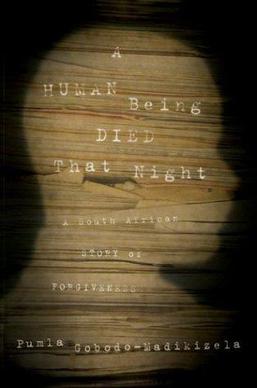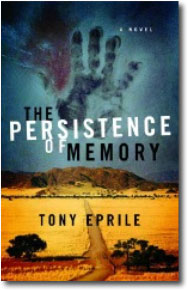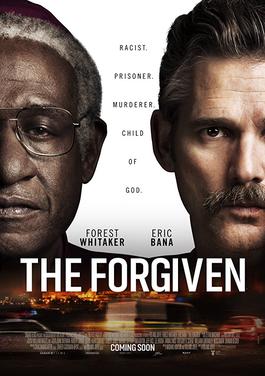
The Truth and Reconciliation Commission (TRC) was a court-like restorative justice body assembled in South Africa in 1996 after the end of apartheid. Authorised by Nelson Mandela and chaired by Desmond Tutu, the commission invited witnesses who were identified as victims of gross human rights violations to give statements about their experiences, and selected some for public hearings. Perpetrators of violence could also give testimony and request amnesty from both civil and criminal prosecution.
To Tell the Truth is an American television panel show in which four celebrity panelists are presented with three contestants and must identify which is the "central character" whose unusual occupation or experience has been read aloud by the show's moderator/host. When the panelists question the contestants, the two impostors may lie whereas the "central character" must tell the truth. The setup adds the impostor element to the format of What's My Line? and I've Got a Secret.

Country of My Skull is a 1998 nonfiction book by Antjie Krog about the South African Truth and Reconciliation Commission (TRC). It is based on Krog's experience as a radio reporter, covering the Commission from 1996 to 1998 for the South African Broadcasting Corporation. The book explores the successes and failures of the Commission, the effects of the proceedings on her personally, and the possibility of genuine reconciliation in post-Apartheid South Africa.

A truth commission, also known as a truth and reconciliation commission or truth and justice commission, is an official body tasked with discovering and revealing past wrongdoing by a government, in the hope of resolving conflict left over from the past. Truth commissions are, under various names, occasionally set up by states emerging from periods of internal unrest, civil war, or dictatorship marked by human rights abuses. In both their truth-seeking and reconciling functions, truth commissions have political implications: they "constantly make choices when they define such basic objectives as truth, reconciliation, justice, memory, reparation, and recognition, and decide how these objectives should be met and whose needs should be served".

In My Country is a 2004 drama film directed by John Boorman, and starring Samuel L. Jackson and Juliette Binoche. It is centred around the story of Afrikaner poet Anna Malan (Binoche) and an American journalist, Langston Whitfield (Jackson), sent to South Africa to report about the South African Truth and Reconciliation Commission hearings.
Duma Joshua Kumalo was a South African human rights activist and one of the Sharpeville Six. He was condemned to death under the 1984 law of "common purpose", which allowed a person to be convicted for having been in the vicinity of an offence, without personally committing it. In 1988, he received a stay of execution the day before sentence was to be carried out. Following his release from jail in 1991, Kumalo became involved in many human rights activities, including discussions about the Truth and Reconciliation Commission and work with Amnesty International. He was a founder member of the Khulumani Support Group for victims of apartheid-related violence.
The South African Civil Cooperation Bureau (CCB), was a government-sponsored death squad, during the apartheid era. The CCB, operated under the authority of Defence Minister General Magnus Malan. The Truth and Reconciliation Committee pronounced the CCB guilty of numerous killings, and suspected more killings.

The Truth and Reconciliation Commission of Canada was a truth and reconciliation commission active in Canada from 2008 to 2015, organized by the parties of the Indian Residential Schools Settlement Agreement.

A Human Being Died That Night is a 2003 book by Pumla Gobodo-Madikizela.
The Baháʼí Faith in South Africa began with the holding of Baháʼí meetings in the country in 1911. A small population of Baháʼís remained until 1950 when large numbers of international Baháʼí pioneers settled in South Africa. In 1956, after members of various tribes in South Africa became Baháʼís, a regional Baháʼí Assembly which included South Africa was elected. Later each of the constituent countries successively formed their own independent Baháʼí National Spiritual Assembly. Then in 1995, after a prolonged period of growth and oppression during Apartheid and the homelands reuniting with South Africa, the Baháʼí National Spiritual Assembly of South Africa was formed. In 2005 Baháʼís were estimated at about 240,100 adherents.

The Persistence of Memory is a novel by Tony Eprile. It was published in 2004 by W. W. Norton & Company. The story portrays 1960s and 1970s South Africa through the experiences of Paul Sweetbread, a young Jewish South African with a photographic memory. The novel follows Paul from his experiences in school, through his service in the South African Defence Force during the country's border war, to his participation in the Truth and Reconciliation Commission. The novel deals heavily with the question of white liberal guilt during the apartheid regime.
Ubu and the Truth Commission is a South African play by Jane Taylor. It was first produced on 26 May 1997, directed by William Kentridge at The Laboratory in Johannesburg's Market Theatre.
The Dead Wait is a play by Paul Herzberg which tells the tale of a young South African athlete, conscripted as a soldier in the Angolan Civil War, who tries to own up to a crime on arriving back home. Partly autobiographical, it draws on Herzberg's similar experiences prior to his leaving South Africa. It was aired for a spell on BBC Radio.

The Solomon Islands Truth and Reconciliation Commission (TRC) is a commission officially established by the government of Solomon Islands in September 2008. It has been formed to investigate the causes of the ethnic violence that gripped Solomon Islands between 1997 and 2003. The Truth and Reconciliation Commission is the first of its kind in the Pacific Islands region.
Ashley Kriel was a South African anti-apartheid activist who was killed by police in Cape Town on 9 July 1987 for his role in the anti-apartheid movement. In 1999, the Truth and Reconciliation Commission granted Jeffrey Benzien amnesty for his part in the killing.

The Handspring Puppet Company is a puppetry performance and design company established in 1981 by Adrian Kohler, Basil Jones, Jon Weinberg and Jill Joubert. It is based in Cape Town, South Africa.

Children of the Light is a documentary film produced by The PeaceJam Foundation about the life of Archbishop Desmond Tutu. It is the first film to tell the life story of Nobel Prize winner Desmond Tutu, one of the fathers of modern-day South Africa, and features extensive archival footage, family photos and never-before-seen interviews. It premiered at the Monte-Carlo Television Festival on June 8, 2014.
Charles Villa-Vicencio is an Emeritus Professor of Religious Studies at the University of Cape Town. He is also a Visiting research professor at Georgetown University. He was a director of the Truth and Reconciliation Commission which organised the public hearings on the atrocities committed during apartheid.

The Forgiven is a 2017 South African drama film directed by Roland Joffé starring Forest Whitaker, Eric Bana and Jeff Gum. Joffé co-wrote the script with Michael Ashton on the basis of the play The Archbishop and the Antichrist by Michael Ashton, which tells a story involving Archbishop Desmond Tutu's search for answers during the Truth and Reconciliation Commission and his meetings with the fictional character Piet Blomfeld.
Lisa C. Ravensbergen is a multi-disciplinary artist and writer of Ojibwe/Swampy Cree and English/Irish descent, based in Vancouver, British Columbia. Ravensbergen is a Jessie-nominated actor, dramaturge, director and dancer. Ravensbergen is an Associate Artist with Full Circle First Nations Performance Group and Playwright-in-Residence with Delinquent Theatre. She holds undergraduate degrees from Trinity Western University and Simon Fraser University and an MA in Cultural Studies from Queens University.











